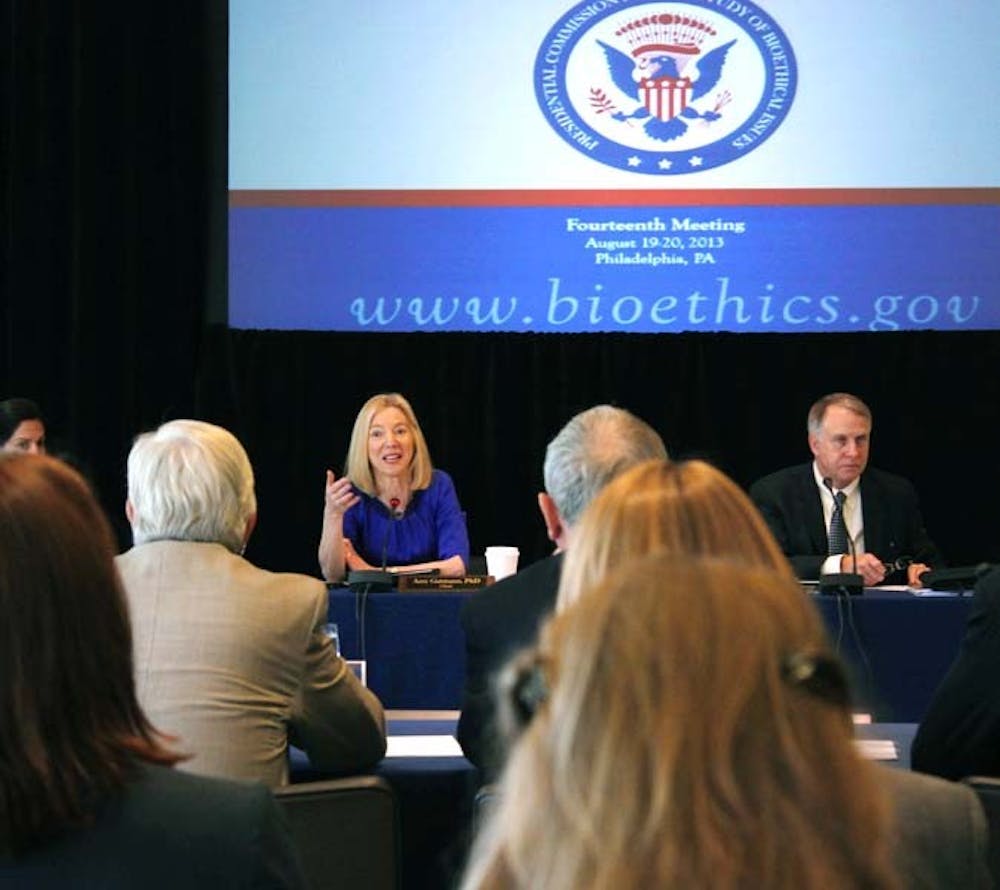Imagine you ordered a test from a genetics company and they discover that you have a high chance of developing early-onset Alzheimer’s. You did not ask to be tested for Alzheimer’s and the scientists know this, but they feel compelled to tell you. This raises for them a conflict without a good resolution.
Ethical issues like this were raised at the Presidential Commission for the Study of Bioethical Issues that convened on Aug. 19 and 20, chaired by Penn President Amy Gutmann. The commission met at the Smilow Center for Translational Research to debate ethical issues surrounding advances in biological technology.
One of the major issues raised over the course of the two days was incidental findings like the situation above. Incidental findings is medical information found in testing that was not the primary target of the test, as defined by Erik Parens, senior research scholar at The Hastings Center.
(Related: ‘Organ Farm’ to educate readers on bioethics)
These sorts of findings can lead to many difficult ethical dilemmas, or, as Georgetown University professor Henry Richardson called them, privacy-based moral entanglements. Parens gave the example of a DNA test run on a fetus for one trait which happened to also reveal a genetic disorder. He then raised the question, “Is some [genetic] information potentially so harmful that looking for it should be prohibited?”
In response, Daniel Sulmasy of the University of Chicago raised the importance of balancing a physician’s duty to the health of the patient with the patient’s right to privacy and consent. The commission concurred that early discussion between physician and patient about the possibility of incidental findings was the key in helping resolve such “moral entanglements.”
The commission also discussed the ethics of the Brain Research through Advancing Innovative Neurotechnologies Initiative, for which President Obama recently pledged a $100 million investment in order to develop technologies to further neuroscience. The initiative is designed to push scientists to fully understand how the brain works and potential applications from the knowledge.
(Related: Obama reappoints Gutmann to bioethics commissions)
“We have a pretty amazing three-pound universe sitting on top of our spinal cord,” said Defense Advanced Research Projects Agency Program Manager William Casebeer. DARPA is set to receive 50 million of the BRAIN funds for a variety of projects, which include plans to develop treatments for post-traumatic stress disorder and to create ways to leverage and augment a soldier’s brain for warfare.
“Brain science brings us closer to the intersection between who we are and how we function,” said New York University professor David Chalmers. Commission members were visibly intrigued by the potential of brain research made possible by the BRAIN Initiative, such as mind control, brain augmentation and perhaps finally finding an answer to the philosophical mind-body problem.
Though participants in the various panels discussed controversial subjects like mind control, the only conclusion reached was that the public and academics should be educated on bioethical issues.
However, some also had reservations about the potential for ethical misconduct made possible by such new technologies.
Gutmann voiced her wish that in the far future, people would not be asking “Why weren’t they thinking ethically and scientifically?” about the BRAIN Initiative.
The commission left some questions unanswered.
Sulmasy said, “The biggest question is what we’re going to focus on. The task is so huge.”



